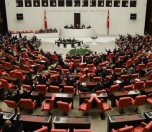Click to read the article in Turkish
The first judicial reform package passes into law today (October 24), after it is published in the Official Gazette.
Article 251 titled, "Simple procedures," which was added to Law No. 5271 on Criminal Procedure, authorizes the penal courts of first instance for "conducting trials through petitions."
Lawyer Güçlü Sevimli said in a comment for bianet that the amendment will open the way for people being sentenced without standing trial.
While it is said that the amendment aims to speed up the process of trials, it completely removes the act of judgment, according to Sevimli.
He stressed that many cases where dissidents are tried, including "social media cases" and cases that were filed for violation of Law No. 2011 on Meetings and Demonstrations, are held at penal courts of first instance.
How will 'simple procedures' be implemented?
According to the amendment, once a penal court of first instance accepts an indictment, it can decide to conduct the trial under simple procedures in cases of "offenses that require a judicial fine and/or offenses the upper limit of which require a prison sentence of two years or less."
Defense statements will be in written form
If a court makes such a decision, it issues the indictment to the defendant, the injured party and the complainant and requests their statements within 15 days. It is also stated in the court notification that the court might make a judgment without a hearing.
The trial is also conducted through written documents. The defendant will not be able to verbally present his/her defense statement at a public hearing and will not have the opportunity to answer the questions of the court.
Judgment without receiving opinion
After the 15-day period ends, the court has the authority to make a judgment without receiving the opinion of the prosecutor or the defendant's last words. The judgment is notified to the parties in written form.
In other words, in a trial that ends without a hearing, the court can decide for a two-year prison sentence or any amount of judicial fine. It can change a sentence into another sanction, postpone a sentence, or defer the announcement of the sentence.
The sentence will be reduced by one fourth
If the court rules for the conviction of the defendant, the sentence is reduced by one fourth. It can change or postpone the sentence or defer the announcement of the sentence unless the defendant objects to such a verdict in written form.
"Many cases where dissidents are tried are in these courts"
Saying how the simple procedures will function will be seen in the forthcoming period, Sevimli noted that it is "unlawful to impose punishment without the act of judgment being performed."
"With this practice, the act of judgment is removed. Considering together with the practice of 'plea bargaining' in the judicial reform package, it will pave the way for imposing punishment without a trial.
"It can be thought that the offenses at penal courts of first instance are not serious but many cases where dissidents are being tried, such as 'social media cases' or cases that were filed for violation of Law No. 2011 on Meetings and Demonstrations, take place in these courts. The implementation apparently has the aim of the immediate conclusion of these cases with punishment.
"The aim here is not speeding up trials, it is imposing punishment without a trial for offenses. But the purpose of the criminal law is to investigate and reveal not the formal but the material truth. The principle of the investigation of the material truth disappears with a jurisdiction like this. Therefore, it is against the law. (AS/VK)












-132.jpg)




